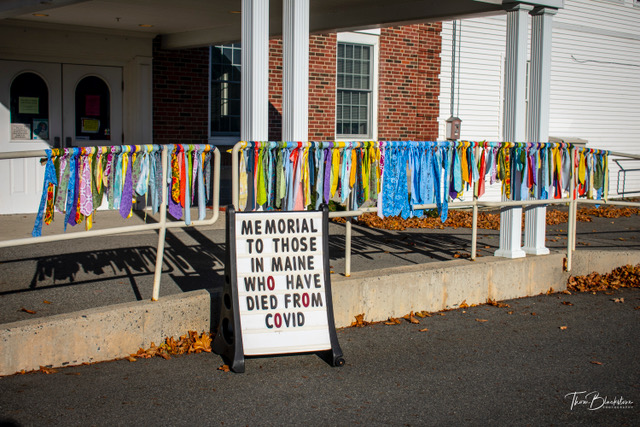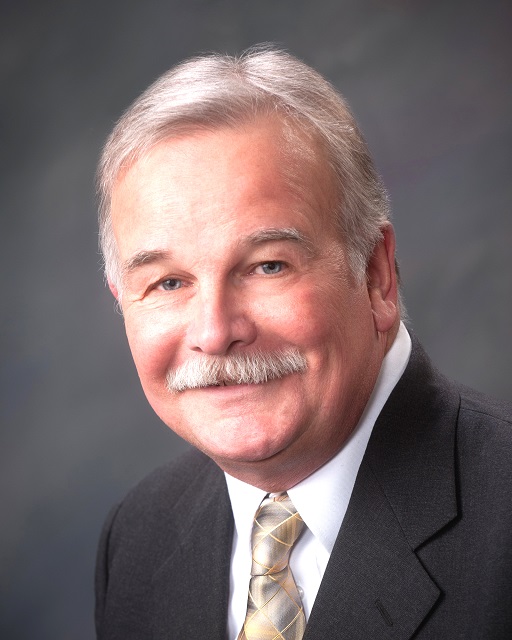Covid-19 memorial at Pleasant Street church
 Rev. Barbara Sagat-Stover, Congregational Coordinator at Pleasant Street United Methodist Church (PSUMC), in Waterville, created a COVID-19 memorial after reading about a Madison, Wisconsin, congregation that created a fabric ribbon tribute on the church outdoor railings. Each of those ribbons represented one of over 1,200 individuals who had died from the virus. Barbara says, “PSUMC memorial started as an extension of our desire to have a special memorial for members of PSUMC that have died in the last year.” These people are recognized by name via the blue ribbons in the center of the display. The remaining ribbons each represent an individual who has died in Maine due to the virus.
Rev. Barbara Sagat-Stover, Congregational Coordinator at Pleasant Street United Methodist Church (PSUMC), in Waterville, created a COVID-19 memorial after reading about a Madison, Wisconsin, congregation that created a fabric ribbon tribute on the church outdoor railings. Each of those ribbons represented one of over 1,200 individuals who had died from the virus. Barbara says, “PSUMC memorial started as an extension of our desire to have a special memorial for members of PSUMC that have died in the last year.” These people are recognized by name via the blue ribbons in the center of the display. The remaining ribbons each represent an individual who has died in Maine due to the virus.
There are currently 159 ribbons displayed on the memorial, but this number increases with every COVID-19 death in Maine. The ribbons are all colors and patterns representing the unique gifts and talents of all the people we have lost. Currently the ribbons for the Maine people lost are anonymous, but they would like to personalize them if family or friends supply the names of those lost to the virus.
The church will continue to display a ribbon for every Maine person who dies from COVID-19. To personalize a ribbon, please call PSUMC (872-7564) and leave the name of the person who died from this virus. With permission, the name will be written on a ribbon. The church will continue to add ribbons for every Maine life lost until this pandemic has ended.
Community members are encouraged to visit the COVID 19 Memorial.


 Members of the American Legion of Tardiff-Belanger Post #39, Madison, are collecting for the Furry Friends at the Somerset Humane Society Animal Shelter, in Skowhegan, during this holiday season. Items can be dropped off at the hall, on 20 S. Maple Street, Madison after 3 p.m., on Wednesdays through Saturdays.
Members of the American Legion of Tardiff-Belanger Post #39, Madison, are collecting for the Furry Friends at the Somerset Humane Society Animal Shelter, in Skowhegan, during this holiday season. Items can be dropped off at the hall, on 20 S. Maple Street, Madison after 3 p.m., on Wednesdays through Saturdays. The Vassalboro Community School Jobs for Maine Graduates (JMG) program will be doing their annual Christmas wreath sale, starting right now until the week after Thanksgiving. They will still be taking orders when they get back from Thanksgiving break.
The Vassalboro Community School Jobs for Maine Graduates (JMG) program will be doing their annual Christmas wreath sale, starting right now until the week after Thanksgiving. They will still be taking orders when they get back from Thanksgiving break. It’s one of Winslow’s most beloved holiday traditions! On Saturday, December 5, from noon to 2 p.m., Winslow Congregational Church (12 Lithgow Street) will be offering over 400 incredibly yummy, ready-to-be-baked turkey pies for curbside/drive-through pick-up. Cost is just $10 per pie, with all proceeds going to empower the Christian/humanitarian work of the church, and for building improvements and repairs.
It’s one of Winslow’s most beloved holiday traditions! On Saturday, December 5, from noon to 2 p.m., Winslow Congregational Church (12 Lithgow Street) will be offering over 400 incredibly yummy, ready-to-be-baked turkey pies for curbside/drive-through pick-up. Cost is just $10 per pie, with all proceeds going to empower the Christian/humanitarian work of the church, and for building improvements and repairs.




 Submitted by Connie Bellet
Submitted by Connie Bellet